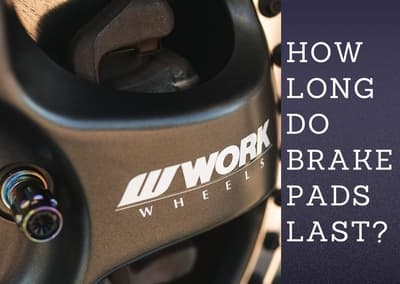How long do brake pads last?

Brake pads are an essential part of the braking system, with their purpose being to generate friction against the brake disc, causing your vehicle to stop. This is why it is essential that you get them replaced at the right time to ensure that you are able to brake safely, keeping yourself and others out of harm on the road. In this article we are going to run down how long your brakes pads last. A lot of components in your car have a limited lifetime and will need to be replaced throughout your vehicles life. This may be through general wear and tear or the component could have been damaged or faulty, and this is the case for brake pads.
When do I need to change my brake pads?
It is suggested that your brake pads need to be changed every 30,000 – 70,000 miles, but there is no specific amount of time that you can allocate to when you need to change your brake pads. This is because there are a lot of variables that can determine when they need to be changed.
Some of these variables include –
Type of journey
The type of journey that you regularly take can have an effect on how long your brake pads last. For example, if you live in the city and your typical journey involves a lot of braking then starting, your brake pads will run down a lot faster than someone who primarily uses the motorway.
How often you drive
This is very similar to the type of journey you regularly take. Simply, if you drive more you are going to use your brake pads up faster.
Weight in your car
The more weight in your car will result in your brake pads being worn down faster. This is because added weight will exert more force onto the brake, therefore putting more stress onto the brake pads.
Signs that the brake pads need changing
As there is only a general guide to when you should change your brake pads, it is essential that you are aware of the signs that they need changing.
4 signs that you need your brake pads changing, are -
- A squeaking noise coming from the brakes
- A brake pad warning light on the dashboard
- A vibrating brake pedal
- Brake pads look visually thin
For more details on signs that your brake pads need changing, click the related article below.
Related: 4 signs your brake pads need changing
The impact of not changing your brake pads
Damage to brake discs
Changing your brake pads are essential to the health of your car and the performance of your braking system. If your brake pads are not changed at the appropriate time then then it can cause damage to the brake disc. This is because when the brake pads grind down enough, the metal part of the pads will begin to catch on the brake disc, causing permanent damage and warping of the disc.
Damage to brake calipers
As well as the brake disc getting damaged, the brake calipers can also be effected. The purpose of the calipers are to hold the brake pads in place and apply the pressure onto the pads that in turn put friction on the disc. If the pads are worn down, then the friction is not properly dispersed onto the pads and can damage the caliper.
Related: Painting Brake Calipers - A step-by-step guide
MOT failure
If the brake discs and calipers are damaged, then this will negatively affect your braking performance. This can put yourself and other drivers in danger and will also result in you failing your MOT check.
Related: Common MOT failures and how to prevent them
Where can I get my brake pads changed?
National Tyres and Autocare have 250 nationwide branches that are fully capable of changing brake pads or fixing any other issues with your braking system.
Related: Click here to find your nearest branch
Did you enjoy this blog post? |4 people found this review helpful



 Sign up for SPECIAL OFFERS
Sign up for SPECIAL OFFERS
